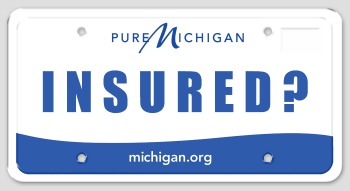KATERI SCHUTT
HNI Account Manager
Michigan has enacted new requirements for insurance companies to electronically provide the Secretary of State (SOS) with the Vehicle Identification Number (VIN) for all vehicles they cover by no-fault insurance. This is being used by the state to flag uninsured vehicles when their plates come up for renewal.
Secretary of State (SOS) with the Vehicle Identification Number (VIN) for all vehicles they cover by no-fault insurance. This is being used by the state to flag uninsured vehicles when their plates come up for renewal.
Because this is still a relatively new process and many plates are coming up for renewal for the first time since this law was enacted, some of our clients have encountered some difficulty with this new process. This blog will explain how the law works, why it was enacted, and some of the issues that have come up during renewal.
About Michigan No Fault Insurance Requirements
Michigan is a "no-fault" state, meaning that both parties involved in an auto accident can file a claim with their insurance company, no matter who caused the crash. No-fault insurance is required for all vehicles in Michigan.
In 2011, Michigan began requiring personal lines insurance carriers to provide the Secretary of State (SOS) the Vehicle Identification Number (VIN) with an electronic list of all vehicles they cover with no-fault insurance every two weeks.
Using these bi-weekly reports, the SOS monitors to see when a VIN drops off the "covered" list supplied by the carriers. If it does, the department flags the VIN and requires a certificate of insurance or automobile insurance identification card when the vehicle owner attempts to renew the plates.
Commercial lines insurance companies are NOT required to submit reports of their private passenger vehicles that are covered by no-fault insurance policies. Some insurance companies are voluntarily reporting this so policy holders can take advantage of online renewal for their vehicles, but the majority right now do not, which results in not having the ability to renew your license plates online (and having to continue to manually renew plates at the SOS office).
Why These Changes Were Implemented
There are a few reasons that changes to the no-fault insurance requirements and reporting process were implemented:
- The automatic reporting requirements allow the state to verify vehicles are covered by auto insurance and push the claim to the auto insurer. This will cut down on Medicaid having to pay out medical claims that are auto-related.
- Electronic reporting sets up the infrastructure to allow the Department of State to offer online renewals using a PIN for those who already have their auto’s VIN in the system. (If SOS doesn't have the VIN information, then you still have to physically go into the SOS to renew all your license plates.)
In some cases, the SOS has taken the extra step of calling carriers to verify the certificate of insurance presented when a person tries to renew the plates. This has resulted in a significant volume of fraud being discovered. The SOS will eventually start sharing this data with the law enforcement information network as well, enabling road patrol to check insurance coverage during a traffic stop or roadside inspection.
Misinformation about Michigan No Fault Insurance Requirements
All Secretary of State branch offices SHOULD accept a printed auto ID card for private passenger vehicles that are insured on your commercial policy when you go in to renew your plates or license. One of our clients was told by an SOS employee that proof of insurance had to come directly from the insurance company to renew, but this is not correct.
SOS employees are supposed to accept printed auto ID cards for commercially insured private passenger vehicles when you walk in to the SOS office to renew the plates, but as previously mentioned, they may verify with the insurance company after the fact.
Another source of confusion is why some people can renew online and others can’t. You will only get a PIN to renew online if the VIN is in the state’s system. This information should be reported bi-weekly by personal lines carriers, but commercial carriers are NOT required to submit this information. Again, some commercial carriers are voluntarily reporting this for private passenger vehicles so that policy holders can take advantage of online renewal (Grange and Allied are two examples of carriers that do this), but the majority right now do not.
Questions about the Michigan No Fault Insurance Requirements?
If you have any questions about the Michigan No-Fault Law, comment below or contact your HNI Relationship Manager. We are happy to help answer any questions that help ensure you have the coverage and information you need!
Related Posts:
Manager Liability When it Comes to HR Issues
Personal Liability Risks for Managers Growing
Risky Business: Is Your Insurance Program Tailormade?
Sample Michigan plate via michigan.org
.png?width=69&height=53&name=Acrisure%20Logo%20(White%20Horizontal).png)


